- Home
- Connie Willis
The Best of Connie Willis Page 10
The Best of Connie Willis Read online
Page 10
15 See Halfwits and Imbeciles: Poetic Evidence of Emily Dickinson’s Opinion of Her Neighbors, by I. Smart, Intelligentsia Press, 1991.
16 Virtually everyone in Amherst kept a diary, containing entries such as “Always knew she’d turn out to be a great poet,” and “Full moon last night. Caught a glimpse of her out in her garden planting peas. Completely deranged.”
17 The inability of people to tell Orson Welles and H. G. Wells apart lends credence to Dickinson’s opinion of humanity. (See Footnote 15.)
18 Not the one at the beginning of the story, which everybody knows about, the one that practically landed on him in the middle of the book which everybody missed because they’d already turned off the radio and were out running up and down the streets screaming, “The end is here! The Martians are coming!”*
* Thus proving again that Emily was right in her assessment of the populace.
19 See Sound, Fury, and Frogs: Emily Dickinson’s Seminal Influence on William Faulkner, by W. Snopes, Yoknapatawpha Press, 1955.
20 She was, of course, already dead, which meant the damage they could inflict was probably minimal.
21 Which she considered a considerable threat. “If the butcher boy should come now, I would jump into the flour barrel,”* she wrote in 1873.
* If she was in the habit of doing this, it may account for her always appearing in white.
22 Particularly nonlinear differential equations.
23 See Lord Byron’s Don Juan: The Mastiff as Muse by C. Harold.
24 He didn’t like people, either. See “Mending Wall,” The Complete Works, Random House. Frost preferred barbed wire fences with spikes on top to walls.
25 See “Semiotic Subterfuge in Wordsworth’s ‘I Wandered Lonely as a Cloud’: A Dialectic Approach,” by N. Compos Mentis, Postmodern Press, 1984.
26 Sort of.
27 The word is either “read” or “heard” or possibly “pacemaker.”
28 Also pleats, tucks, ruching, flounces, frills, ruffles, and passementerie.*
* See Pockets as Political Statement: The Role of Clothing in Early Victorian Feminism, by E. and C. Pankhurst, Angry Women’s Press, 1978.
29 A good writer is never without pencil and paper.*
* Or laptop.
30 See “Posthumous Poems” in Literary Theories That Don’t Hold Water by H. Houdini.
31 Two years later, no longer quite so grief-stricken and thinking of all that lovely money, he dug her up and got them back.*
*I told you poets behaved badly.
32 Try it. No, really. “Be-e-e-cause I could not stop for Death, He kindly stopped for me-e-e.” See?*
*Not all of Dickinson’s poems can be sung to “The Yellow Rose of Texas.”** Numbers 2, 18, and 1411 can be sung to “The Itsy-Bitsy Spider.”
**Could her choice of tunes be a coded reference to the unfortunate Martian landing in Texas? See “The Night of the Cooters” by Howard Waldrop.
33 Normal to Ong, Nebraska.
34 See Freud.
35 Sort of.
36 The near-rhyme theory also explains why Dickinson responded with such fierceness when Thomas Wentworth Higginson changed “pearl” to “jewel.” She knew, as he could not, that the fate of the world might someday rest on her inability to rhyme.
37 For an intriguing possibility, see “The Literary Litterbug: Emily Dickinson’s Note-Dropping as a Response to Thoreau’s Environmentalism,” by P. Walden, Transcendentalist Review, 1990.
38 Number 187’s “awful rivet” is clearly a reference to the Martian cylinder. Number 258’s “There’s a certain slant of light” echoes Wells’s “blinding glare of vivid green light,” and its “affliction / Sent us of the air” obviously refers to the landing. Such allusions indicate that as many as fifty-five* of the poems were written at a later date than originally supposed, and that the entire chronology and numbering system of the poems needs to be reconsidered.
*Significantly enough, the age Emily Dickinson was when she died.
39 A holiday Dickinson did not celebrate because of its social nature, although she was spotted in 1881 lighting a cherry bomb on Mabel Dodd’s porch and running away.*
*Which may be why the Martian landing attracted so little attention. The Amherstodes may have assumed it was Em up to her old tricks again.
40 There is compelling evidence that the Martians, thwarted in New England, went to Long Island. This theory will be the subject of my next paper,* “The Green Light at the End of Daisy’s Dock: Evidence of Martian Invasion in F. Scott Fitzgerald’s The Great Gatsby.”
* I’m up for tenure.
Afterword for “The Soul Selects Her Own Society”
People are always surprised and disturbed by Emily Dickinson’s “reclusive” lifestyle and come up with all sorts of theories to explain her staying in her room, doing her gardening at night, and vanishing upstairs whenever visitors came to call: depression, a skin condition that wouldn’t let her out in the sun, lupus, a love affair that ended badly and that she never got over, agoraphobia, epilepsy, etc.
I, however, find her behavior completely understandable. She lived in Amherst, Massachusetts, for God’s sake.
She had a mind that could connect buggy rides with death, books with sailing ships, and winter light with “the weight of cathedral tunes.” She could write lines like “Tell all the Truth but tell it slant” and “Parting is all we know of heaven and all we need of hell,” and “And then the windows failed, and then I could not see to see.” She was funny, ironic, and very smart, and she was stuck in a small town where people’s top concerns were bread baking and antimacassar crocheting, where they liked poems that rhymed and had opinions on everything and everybody—and breathlessly repeated them to everybody else. “Did you hear what that Dickinson girl said?”
I see Amherst as sort of a cross between Avonlea (without Anne of Green Gables), Yonkers (without Dolly Levi), Gopher Prairie, Minnesota, and River City, Iowa, a small all-American town where the entire populace consists of Mrs. Rachel Lynde, Horace Vandergelder, and Eulalie Mackechnie Shinn.
I’d have stayed in my room, too.
FIRE WATCH
History hath triumphed over time, which besides it nothing but eternity hath triumphed over.
—SIR WALTER RALEIGH
September 20—Of course the first thing I looked for was the fire watch stone. And of course it wasn’t there yet. It wasn’t dedicated until 1951, accompanying speech by the Very Reverend Dean Walter Matthews, and this is only 1940. I knew that. I went to see the fire watch stone only yesterday, with some kind of misplaced notion that seeing the scene of the crime would somehow help. It didn’t.
The only things that would have helped were a crash course in “London During the Blitz” and a little more time. I had not gotten either.
“Traveling in time is not like taking the Tube, Mr. Bartholomew,” the esteemed Dunworthy had said, blinking at me through those antique spectacles of his. “Either you report on the twentieth or you don’t go at all.”
“But I’m not ready,” I’d said. “Look, it took me four years to get ready to travel with St. Paul. St. Paul. Not St. Paul’s. You can’t expect me to get ready for London in the Blitz in two days.”
“Yes,” Dunworthy had said. “We can.” End of conversation.
“Two days!” I had shouted at my roommate Kivrin. “All because some computer adds an apostrophe s.
“And the esteemed Dunworthy doesn’t even bat an eye when I tell him. ‘Time travel is not like taking the Tube, young man,’ he says. ‘I’d suggest you get ready. You’re leaving day after tomorrow.’ The man’s a total incompetent.”
“No,” she said. “He isn’t. He’s the best there is. He wrote the book on St. Paul’s. Maybe you should listen to what he says.”
I had expected Kivrin to be at least a little sympathetic. She had been practically hysterical when her practicum got changed from fifteenth- to fourteenth-century England, and how did either century qualify as a pra
cticum? Even counting infectious diseases, they couldn’t have been more than a five. The Blitz is an eight, and St. Paul’s itself is, with my luck, a ten.
“You think I should go see Dunworthy again?” I said.
“Yes.”
“And then what? I’ve got two days. I don’t know the money, the language, the history. Nothing.”
“He’s a good man,” Kivrin said. “I think you’d better listen to him while you can.” Good old Kivrin. Always the sympathetic ear.
The good man was responsible for my standing just inside the propped-open west doors, gawking like the country boy I was supposed to be, looking for a stone that wasn’t there. Thanks to the good man, I was about as unprepared for my practicum as it was possible for him to make me.
I couldn’t see more than a few feet into the church. I could see a candle gleaming feebly a long way off and a closer blur of white moving toward me. A verger, or possibly the Very Reverend Dean himself. I pulled out the letter from my clergyman uncle in Wales that was supposed to gain me access to the Dean, and patted my back pocket to make sure I hadn’t lost the microfiche Oxford English Dictionary, Revised, with Historical Supplements I’d smuggled out of the Bodleian. I couldn’t pull it out in the middle of the conversation, but with luck I could muddle through the first encounter by context and look up the words I didn’t know later.
“Are you from the ayarpee?” he said. He was no older than I am, a head shorter and much thinner. Almost ascetic-looking. He reminded me of Kivrin. He was not wearing white, but clutching it to his chest. In other circumstances I would have thought it was a pillow. In other circumstances I would know what was being said to me, but there had been no time to unlearn sub-Mediterranean Latin and Jewish law and learn Cockney and air-raid procedures.
Two days, and the esteemed Dunworthy, who wanted to talk about the sacred burdens of the historian instead of telling me what the ayarpee was.
“Are you?” he demanded again.
I considered whipping out the OED after all on the grounds that Wales was a foreign country, but I didn’t think they had microfiche in 1940. Ayarpee. It could be anything, including a nickname for the fire watch, in which case the impulse to say no was not safe at all. “No,” I said.
He lunged suddenly toward and past me and peered out the open doors. “Damn,” he said, coming back to me. “Where are they, then? Bunch of lazy bourgeois tarts!” And so much for getting by on context.
He looked at me closely, suspiciously, as if he thought I was only pretending not to be with the ayarpee. “The church is closed,” he said finally.
I held up the envelope and said, “My name’s Bartholomew. Is Dean Matthews in?”
He looked out the door a moment longer as if he expected the lazy bourgeois tarts at any moment and intended to attack them with the white bundle, then he turned and said, as if he were guiding a tour, “This way, please,” and took off into the gloom.
He led me to the right and down the south aisle of the nave. Thank God I had memorized the floor plan or, at that moment, heading into total darkness, led by a raving verger, the whole bizarre metaphor of my situation would have been enough to send me out the west doors and back to St. John’s Wood. It helped a little to know where I was. We should have been passing number twenty-six: Hunt’s painting The Light of the World—Jesus with his lantern—but it was too dark to see it. We could have used the lantern ourselves.
He stopped abruptly ahead of me, still raving. “We weren’t asking for the bloody savoy, just a few cots. Nelson’s better off than we are—at least he’s got a pillow provided.” He brandished the white bundle like a torch in the darkness. It was a pillow, after all. “We asked for them over a fortnight ago, and here we still are, sleeping on the bleeding generals from Trafalgar because those bitches want to play tea and crumpets with the tommies at victoria and the hell with us!”
He didn’t seem to expect me to answer his outburst, which was good, because I had understood perhaps one key word in three. He stomped on ahead, moving out of sight of the one pathetic altar candle and stopping again at a black hole. Number twenty-five: stairs to the Whispering Gallery, the dome, the library (not open to the public.)
Up the stairs, down a hall, stop again at a medieval door and knock. “I’ve got to go wait for them,” he said. “If I’m not there they’ll likely take them over to the abbey. Tell the Dean to ring them up again, will you?” and he took off down the stone steps, still holding his pillow like a shield against him.
He had knocked, but the door was at least a foot of solid oak, and it was obvious the Very Reverend Dean had not heard. I was going to have to knock again. Yes, well, and the man holding the pinpoint had to let go of it, too, but even knowing it will all be over in a moment and you won’t feel a thing doesn’t make it any easier to say, “Now!”
So I stood in front of the door, cursing the history department and the esteemed Dunworthy and the computer that had made the mistake and brought me here to this dark door with only a letter from a fictitious uncle whom I trusted no more than I trusted the rest of them.
Even the old reliable Bodleian had let me down. The batch of research stuff I’d cross-ordered through Balliol and the main terminal is probably sitting in my room right now, a century out of reach. And Kivrin, who had already done her practicum and should have been bursting with advice, walked around as silent as a saint until I begged her to help me.
“Did you go to see Dunworthy?” she said.
“Yes. You want to know what priceless bit of information he had for me? ‘Silence and humility are the sacred burdens of the historian.’ He also told me I would love St. Paul’s. Golden gems from the Master. Unfortunately, what I need to know are the times and places of the bombs so one doesn’t fall on me.” I flopped down on the bed. “Any suggestions?”
“How good are you at memory retrieval?” she said.
I sat up. “I’m pretty good. You think I should assimilate?”
“There isn’t time for that,” she said. “I think you should put everything you can directly into long-term.”
“You mean endorphins?” I said.
The biggest problem with using memory-assistance drugs to put information into your long-term memory is that it never sits, even for a microsecond, in your short-term memory, and that makes retrieval complicated, not to mention unnerving. It gives you the most unsettling sense of déjà vu to suddenly know something you’re positive you’ve never seen or heard before.
The main problem, though, is not eerie sensations but retrieval. Nobody knows exactly how the brain gets what it wants out of storage, but short-term is definitely involved. That brief, sometimes microscopic, time information spends in short-term is apparently used for something besides tip-of-the-tongue availability. The whole complex sort-and-file process of retrieval is apparently centered in short-term, and without it, and without the help of the drugs that put it there or artificial substitutes, information can be impossible to retrieve. I’d used endorphins for examinations and never had any difficulty with retrieval, and it looked like it was the only way to store all the information I needed in anything approaching the time I had left, but it also meant that I would never have known any of the things I needed to know, even for long enough to have forgotten them. If and when I could retrieve the information, I would know it. Till then I was as ignorant of it as if it were not stored in some cobwebbed corner of my mind at all.
“You can retrieve without artificials, can’t you?” Kivrin said, looking skeptical.
“I guess I’ll have to.”
“Under stress? Without sleep? Low body endorphin levels?” What exactly had her practicum been? She had never said a word about it, and undergraduates are not supposed to ask. Stress factors in the Middle Ages? I thought everybody slept through them.
“I hope so,” I said. “Anyway, I’m willing to try this idea if you think it will help.”
She looked at me with that martyred expression and said, “Nothing will help.
” Thank you, St. Kivrin of Balliol.
But I tried it anyway. It was better than sitting in Dunworthy’s rooms having him blink at me through his historically accurate eyeglasses and tell me I was going to love St. Paul’s. When my Bodleian requests didn’t come, I overloaded my credit and bought out Blackwell’s. Tapes on World War II, Celtic literature, history of mass transit, tourist guidebooks, everything I could think of. Then I rented a highspeed recorder and shot up. When I came out of it, I was so panicked by the feeling of not knowing any more than I had when I started that I took the Tube to London and raced up Ludgate Hill to see if the fire watch stone would trigger any memories.
It didn’t.
“Your endorphin levels aren’t back to normal yet,” I told myself and tried to relax, but that was impossible with the prospect of the practicum looming up before me. And those are real bullets, kid. Just because you’re a history undergraduate doing his practicum doesn’t mean you can’t get killed.
I read history books all the way home on the Tube and right up until Dunworthy’s flunkies came to take me to St. John’s Wood this morning. Then I jammed the microfiche OED in my back pocket and went off feeling as if I would have to survive by my native wit and hoping I could get hold of artificials in 1940. Surely I could get through the first day without mishap, I thought, and now here I was, stopped cold by almost the first word that had been spoken to me.
Well, not quite. In spite of Kivrin’s advice that I not put anything in short-term, I’d memorized the British money, a map of the tube system, a map of my own Oxford. It had gotten me this far. Surely I would be able to deal with the Dean.
Just as I had almost gotten up the courage to knock, he opened the door, and as with the pinpoint, it really was over quickly and without pain. I handed him my letter and he shook my hand and said something understandable like, “Glad to have another man, Bartholomew.”

 Passage
Passage Bellwether
Bellwether Blackout
Blackout Doomsday Book
Doomsday Book A Lot Like Christmas: Stories
A Lot Like Christmas: Stories Water Witch
Water Witch To Say Nothing of the Dog
To Say Nothing of the Dog Fire Watch
Fire Watch The Winds of Marble Arch and Other Stories
The Winds of Marble Arch and Other Stories Uncharted Territory
Uncharted Territory All Clear
All Clear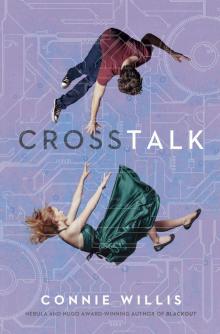 Crosstalk
Crosstalk Lincoln's Dreams
Lincoln's Dreams Miracle and Other Christmas Stories
Miracle and Other Christmas Stories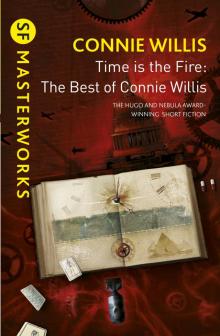 Time is the Fire
Time is the Fire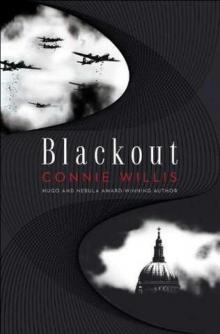 Blackout ac-1
Blackout ac-1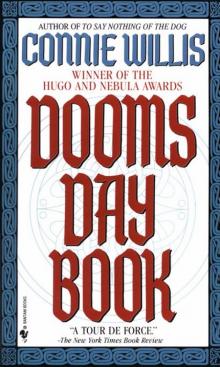 Dooms Day Book
Dooms Day Book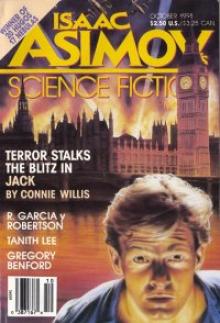 Jack
Jack The Doomsday Book
The Doomsday Book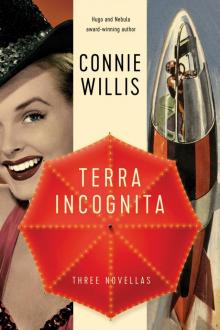 Terra Incognita
Terra Incognita The Best of Connie Willis
The Best of Connie Willis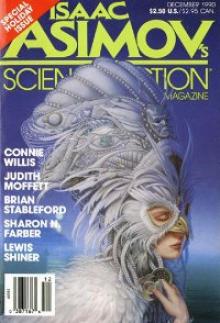 Cibola
Cibola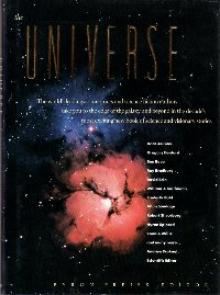 Schwarzschild Radius
Schwarzschild Radius Even the Queen
Even the Queen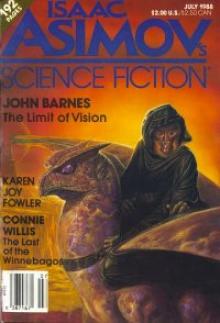 The Last of the Winnebagos
The Last of the Winnebagos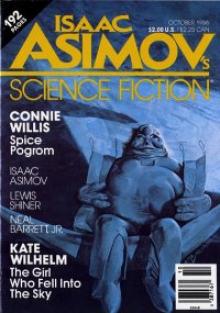 Spice Pogrom
Spice Pogrom Oxford Time Travel 1 - Blackout
Oxford Time Travel 1 - Blackout At The Rialto
At The Rialto A Lot Like Christmas
A Lot Like Christmas